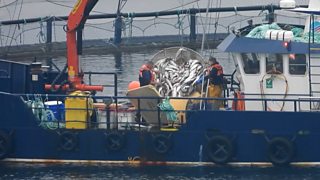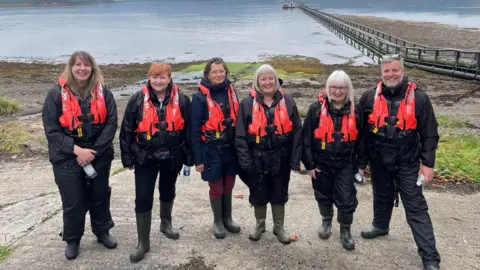By Tavish Scott
Published 1st Oct 2024
Scotland’s salmon farmers are developing innovative new techniques to keep their fish safe from the wider effects of rising sea temperatures
The past few months have masqueraded as summer. Walking to the office during the Edinburgh festivals was akin to a version of the Cruel Sea with water running amok. But while lower air and sea temperatures and above-average rainfall and gusty winds are miserable for humans, this is great weather for fish
Compared to 2023, when some coastal waters around the UK saw temperatures four to five degrees warmer than average, 2024 has been the polar opposite. The El Niño weather patterns are widely accepted as contributing to that phenomenon, but forecasters predict that this period is now past – and temperatures have reduced in line with normal trends.
Seawater temperatures are not a direct problem for the salmon being raised on Scotland’s coastal west strip and around the islands; they thrive within a range. Fish are cold-blooded, so higher seawater temperatures actually encourage growth and allows the harvest weight to be reached more quickly.
Algal blooms and micro-jellyfish
However, warmer seas also mean an increase in plankton, algal blooms and micro-jellyfish –marine species that can harm salmon. Fish farmers – like all farmers – want as many of their animals to make it to market, even more so when Scottish salmon has never been in more demand.
So this year has, therefore, seen a very welcome and significant increase in survival rates at Scotland’s salmon farms. In fact, the most recent published figures for August 2024 show the best survival rates in five years.
 Scotland's salmon farms have a long history of innovation (Picture: Jeff J Mitchell) | Getty Images
Scotland's salmon farms have a long history of innovation (Picture: Jeff J Mitchell) | Getty ImagesThe percentage of fallen stock was less than half the same month the year before, and the lowest level of monthly mortality since August 2019. It is testament to the hard work of the men and women, the vets and the farm assistants, working in our sector that we seem to have turned a corner.
But we know that climate change will continue to pose a significant challenge to all forms of food production – on land and at sea. We can’t simply stand back and hope that normal seawater temperatures continue in the years ahead.
Curtains made of air
That’s why salmon farming companies are investing in innovation, research and development, something which Scotland has a long, proud history of pioneering. We have been farming in the seas around Scotland for half a century, and the knowledge and experience we have built up over that time will help us thrive into the future.
I am often asked what is the solution to the challenges posed by climate change? Salmon farmers now have an increasing number of tools at their fingertips to provide the best growing conditions for fish.
These include aeration and oxygenation of seawater added to feeding techniques that reduce the time salmon spend near the water’s surface. Other innovations such as bubble curtains use air to create a barrier which prevents contact with organisms that are harmful to our fish.
And several farming companies are also developing initiatives that will see larger fish put to sea, reducing the amount of time salmon spend in the elements.
With its low carbon footprint, Scottish salmon is exactly the sort of food the world needs. And through the very best in Scottish innovation, research and development, we can overcome the challenge of climate change.
Tavish Scott is chief executive of Salmon Scotland, the trade body for the salmon farming sector
Inspectors have no concerns over dead salmon at fish farm

Dead salmon being removed before the visit by MSPs
Government inspectors say they have no concerns over the number of dead salmon removed from a fish farm just hours before MSPs visited.
Members of the Scottish Parliament's rural affairs committee visited Dunstaffnage fish farm near Oban on Monday 25 September for a fact-finding mission.
Animal Equality UK accused the fish farm operator of trying to paint a "wholly inaccurate" picture of the industry but Scottish Sea Farms insisted the footage showed "routine" operations.
Members of the Fish Health Inspectorate have now told committee members dead fish removal is a "recognised aspect of animal husbandry".
The committee is holding a follow-up inquiry into how the sector has changed since a damning report in 2018 raised environmental concerns.
Following the release of the footage of dead and dying fish being removed, a spokesperson for the committee said it had heard concerns about fish mortality on salmon farms during its inquiry and added that the footage raised further questions for the committee.
BBC Scotland News understands that the removal of the fish on 25 September was not discussed with MSPs.
Fish farm 'removed tonnes of dead salmon' before visit by MSPs
Farmed salmon production drops by a fifth
Animal Equality UK accused the industry of wanting to "hide the truth" regarding parasites and diseases.
But Scottish Sea Farms, which operates the site, insisted the footage showed teams following standard operating procedures by regularly removing dead or dying fish.
It said the number of fish removed each time would vary between pens and from day to day.
But it insisted it had "categorically not" had a mass mortality event.
The inspectorate has written to the parliament committee saying 1,082kg of biomass was removed from the site on the day the footage was taken but said the mortality levels had not been above the voluntary reporting levels.
It said: "The FHI do not have concerns with the routine mortality removal procedure being undertaken in the video footage."

Scottish Parliament
Six members of the rural economy and islands committee visited the salmon farm
On Tuesday, Dr Ralph Bickerdike, head of fish health & welfare at Scottish Sea Farms, said: "The response by the Fish Health Inspectorate reinforces what we clearly stated to the BBC last week: that the footage shows our farm team fulfilling their duty of care by swiftly removing any poorly fish or fallen stock, something we do each morning where conditions allow."
Abigail Penny, executive director of Animal Equality UK, said: "The public outcry upon seeing this footage speaks for itself.
"Containers full to the brim of dead animals tell a story that percentages on a page cannot. The fact this doesn't even cause regulators to bat an eyelid is deeply troubling.
"If this is business as usual, MSPs must question whether this is an industry Scotland should continue supporting."
Parasitic sea lice
Scottish salmon is the UK's biggest food export, worth £578m in 2022.
But the number of fish dying on farms has been increasing, with a record 17 million salmon deaths reported in Scotland last year.
Warm sea temperatures have led to a significant increase in micro-jellyfish which cause harm to farmed salmon.
There are also long-standing concerns around parasitic sea lice and the use of chemical treatments in open waters.
In 2018, Holyrood's environment committee concluded that Scotland's marine ecosystem faced "irrecoverable damage" from an expansion in fish farming.
A report by the regulator Sepa, in the same year, found that almost one in five salmon farms in Scotland failed to meet statutory environmental standards.
Another report, by the Scottish parliament's rural economy committee, made 65 recommendations for improvement but stopped short of backing a moratorium on new fish farms.
The current inquiry is examining to what extent those recommendations have been implemented.
Six members of the rural economy and islands committee visited the salmon farm
On Tuesday, Dr Ralph Bickerdike, head of fish health & welfare at Scottish Sea Farms, said: "The response by the Fish Health Inspectorate reinforces what we clearly stated to the BBC last week: that the footage shows our farm team fulfilling their duty of care by swiftly removing any poorly fish or fallen stock, something we do each morning where conditions allow."
Abigail Penny, executive director of Animal Equality UK, said: "The public outcry upon seeing this footage speaks for itself.
"Containers full to the brim of dead animals tell a story that percentages on a page cannot. The fact this doesn't even cause regulators to bat an eyelid is deeply troubling.
"If this is business as usual, MSPs must question whether this is an industry Scotland should continue supporting."
Parasitic sea lice
Scottish salmon is the UK's biggest food export, worth £578m in 2022.
But the number of fish dying on farms has been increasing, with a record 17 million salmon deaths reported in Scotland last year.
Warm sea temperatures have led to a significant increase in micro-jellyfish which cause harm to farmed salmon.
There are also long-standing concerns around parasitic sea lice and the use of chemical treatments in open waters.
In 2018, Holyrood's environment committee concluded that Scotland's marine ecosystem faced "irrecoverable damage" from an expansion in fish farming.
A report by the regulator Sepa, in the same year, found that almost one in five salmon farms in Scotland failed to meet statutory environmental standards.
Another report, by the Scottish parliament's rural economy committee, made 65 recommendations for improvement but stopped short of backing a moratorium on new fish farms.
The current inquiry is examining to what extent those recommendations have been implemented.
No comments:
Post a Comment